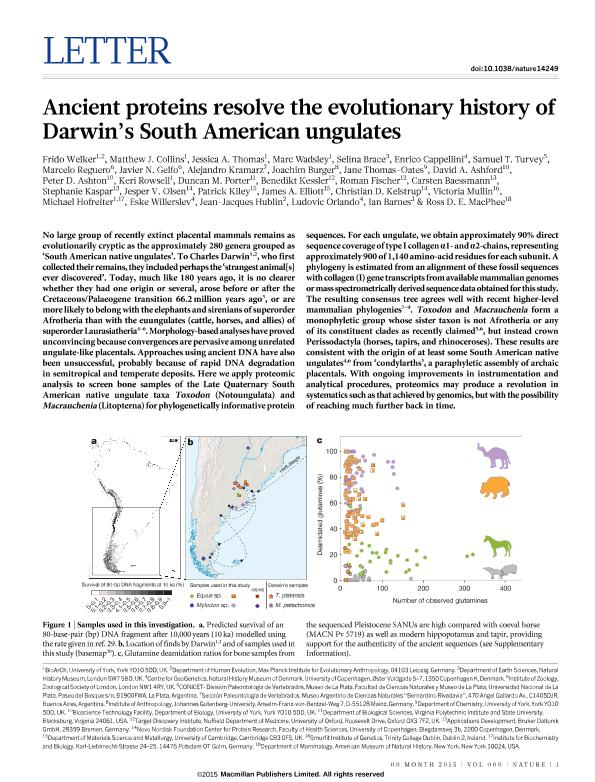Mostrar el registro sencillo del ítem
dc.contributor.author
Welker, Frido
dc.contributor.author
Collins, Matthew J.
dc.contributor.author
Thomas, Jessica A.
dc.contributor.author
Wadsley, Marc
dc.contributor.author
Brace, Selina
dc.contributor.author
Cappellini, Enrico
dc.contributor.author
Turvey, Samuel T.
dc.contributor.author
Reguero, Marcelo Alfredo

dc.contributor.author
Gelfo, Javier Nicolás

dc.contributor.author
Kramarz, Alejandro Gustavo

dc.contributor.author
Burger, Joachim
dc.contributor.author
Thomas Oates, Jane
dc.contributor.author
Ashford, David A.
dc.contributor.author
Ashton, Peter D.
dc.contributor.author
Rowsell, Keri
dc.contributor.author
Porter, Duncan M.
dc.contributor.author
Kessler, Benedikt
dc.contributor.author
Fischer, Roman
dc.contributor.author
Baessmann, Carsten
dc.contributor.author
Kaspar, Stephanie
dc.contributor.author
Olsen, Jesper V.
dc.contributor.author
Kiley, Patrick
dc.contributor.author
Elliott, James A.
dc.contributor.author
Kelstrup, Christian D.
dc.contributor.author
Mullin, Victoria
dc.contributor.author
Hofreiter, Michael
dc.contributor.author
Willerslev, Eske
dc.contributor.author
Hublin, Jean Jacques
dc.contributor.author
Orlando, Ludovic
dc.contributor.author
Barnes, Ian
dc.contributor.author
Macphee, Ross D. E.
dc.date.available
2018-06-25T16:00:52Z
dc.date.issued
2015-06
dc.identifier.citation
Welker, Frido; Collins, Matthew J.; Thomas, Jessica A.; Wadsley, Marc; Brace, Selina; et al.; Ancient proteins resolve the evolutionary history of Darwin's South American ungulates; Nature Publishing Group; Nature; 522; 7554; 6-2015; 81-84
dc.identifier.issn
0028-0836
dc.identifier.uri
http://hdl.handle.net/11336/49922
dc.description.abstract
No large group of recently extinct placental mammals remains as evolutionarily cryptic as the approximately 280 genera grouped as South American native ungulates'. To Charles Darwin, who first collected their remains, they included perhaps the strangest animal[s] ever discovered'. Today, much like 180 years ago, it is no clearer whether they had one origin or several, arose before or after the Cretaceous/Palaeogene transition 66.2 million years ago, or are more likely to belong with the elephants and sirenians of superorder Afrotheria than with the euungulates (cattle, horses, and allies) of superorder Laurasiatheria. Morphology-based analyses have proved unconvincing because convergences are pervasive among unrelated ungulate-like placentals. Approaches using ancient DNA have also been unsuccessful, probably because of rapid DNA degradation in semitropical and temperate deposits. Here we apply proteomic analysis to screen bone samples of the Late Quaternary South American native ungulate taxa Toxodon (Notoungulata) and Macrauchenia (Litopterna) for phylogenetically informative protein sequences. For each ungulate, we obtain approximately 90% direct sequence coverage of type I collagen α1- and α2-chains, representing approximately 900 of 1,140 amino-acid residues for each subunit. A phylogeny is estimated from an alignment of these fossil sequences with collagen (I) gene transcripts from available mammalian genomes or mass spectrometrically derived sequence data obtained for this study. The resulting consensus tree agrees well with recent higher-level mammalian phylogenies. Toxodon and Macrauchenia form a monophyletic group whose sister taxon is not Afrotheria or any of its constituent clades as recently claimed, but instead crown Perissodactyla (horses, tapirs, and rhinoceroses). These results are consistent with the origin of at least some South American native ungulates from 'condylarths', a paraphyletic assembly of archaic placentals. With ongoing improvements in instrumentation and analytical procedures, proteomics may produce a revolution in systematics such as that achieved by genomics, but with the possibility of reaching much further back in time.
dc.format
application/pdf
dc.language.iso
eng
dc.publisher
Nature Publishing Group

dc.rights
info:eu-repo/semantics/openAccess
dc.rights.uri
https://creativecommons.org/licenses/by-nc-sa/2.5/ar/
dc.subject
Ancient Proteins
dc.subject
Toxodon
dc.subject
Macrauchenia
dc.subject
Phylogeny
dc.subject.classification
Meteorología y Ciencias Atmosféricas

dc.subject.classification
Ciencias de la Tierra y relacionadas con el Medio Ambiente

dc.subject.classification
CIENCIAS NATURALES Y EXACTAS

dc.title
Ancient proteins resolve the evolutionary history of Darwin's South American ungulates
dc.type
info:eu-repo/semantics/article
dc.type
info:ar-repo/semantics/artículo
dc.type
info:eu-repo/semantics/publishedVersion
dc.date.updated
2018-05-21T14:39:10Z
dc.journal.volume
522
dc.journal.number
7554
dc.journal.pagination
81-84
dc.journal.pais
Reino Unido

dc.journal.ciudad
Londres
dc.description.fil
Fil: Welker, Frido. Institut Max Planck for Evolutionary Anthropology; Alemania. University of York; Reino Unido
dc.description.fil
Fil: Collins, Matthew J.. University of York; Reino Unido
dc.description.fil
Fil: Thomas, Jessica A.. University of York; Reino Unido
dc.description.fil
Fil: Wadsley, Marc. University of York; Reino Unido
dc.description.fil
Fil: Brace, Selina. Natural History Museum; Reino Unido
dc.description.fil
Fil: Cappellini, Enrico. Universidad de Copenhagen; Dinamarca. Natural History Museum of Denmark; Dinamarca
dc.description.fil
Fil: Turvey, Samuel T.. Zoological Society of London. Institute of Zoology; Reino Unido
dc.description.fil
Fil: Reguero, Marcelo Alfredo. Consejo Nacional de Investigaciones Científicas y Técnicas. Centro Científico Tecnológico Conicet - La Plata; Argentina. Universidad Nacional de La Plata. Facultad de Ciencias Naturales y Museo. División Paleontología Vertebrados; Argentina
dc.description.fil
Fil: Gelfo, Javier Nicolás. Consejo Nacional de Investigaciones Científicas y Técnicas. Centro Científico Tecnológico Conicet - La Plata; Argentina. Universidad Nacional de La Plata. Facultad de Ciencias Naturales y Museo. División Paleontología Vertebrados; Argentina
dc.description.fil
Fil: Kramarz, Alejandro Gustavo. Consejo Nacional de Investigaciones Científicas y Técnicas. Oficina de Coordinación Administrativa Parque Centenario. Museo Argentino de Ciencias Naturales “Bernardino Rivadavia”; Argentina
dc.description.fil
Fil: Burger, Joachim. Johhannes Gutenberg Universität. Institut für Anthropologie Anselm-Franz-von-Bentzel-Weg; Alemania
dc.description.fil
Fil: Thomas Oates, Jane. University of York; Reino Unido
dc.description.fil
Fil: Ashford, David A.. University of York; Reino Unido
dc.description.fil
Fil: Ashton, Peter D.. University of York; Reino Unido
dc.description.fil
Fil: Rowsell, Keri. University of York; Reino Unido
dc.description.fil
Fil: Porter, Duncan M.. Virginia Polytechnic Institute; Estados Unidos
dc.description.fil
Fil: Kessler, Benedikt. University of Oxford; Reino Unido
dc.description.fil
Fil: Fischer, Roman. University of Oxford; Reino Unido
dc.description.fil
Fil: Baessmann, Carsten. Bruker Daltonik GmbH. Applications Development; Alemania
dc.description.fil
Fil: Kaspar, Stephanie. Bruker Daltonik GmbH. Applications Development; Alemania
dc.description.fil
Fil: Olsen, Jesper V.. Universidad de Copenhagen; Dinamarca
dc.description.fil
Fil: Kiley, Patrick. University of Cambridge; Estados Unidos
dc.description.fil
Fil: Elliott, James A.. University of Cambridge; Estados Unidos
dc.description.fil
Fil: Kelstrup, Christian D.. Universidad de Copenhagen; Dinamarca
dc.description.fil
Fil: Mullin, Victoria. Trinity College Dublin. Smurfit Institute of Genetics; Irlanda
dc.description.fil
Fil: Hofreiter, Michael. University of York; Reino Unido. Universität Potsdam. Institut für Biochemie und Biologie; Alemania
dc.description.fil
Fil: Willerslev, Eske. Universidad de Copenhagen; Dinamarca. Natural History Museum of Denmark; Dinamarca
dc.description.fil
Fil: Hublin, Jean Jacques. Institut Max Planck for Evolutionary Anthropology; Alemania
dc.description.fil
Fil: Orlando, Ludovic. Universidad de Copenhagen; Dinamarca. Natural History Museum of Denmark; Dinamarca
dc.description.fil
Fil: Barnes, Ian. Natural History Museum; Reino Unido
dc.description.fil
Fil: Macphee, Ross D. E.. American Museum Of Natural History. New York; Estados Unidos
dc.journal.title
Nature

dc.relation.alternativeid
info:eu-repo/semantics/altIdentifier/doi/https://dx.doi.org/10.1038/nature14249
dc.relation.alternativeid
info:eu-repo/semantics/altIdentifier/url/https://www.nature.com/articles/nature14249
Archivos asociados
